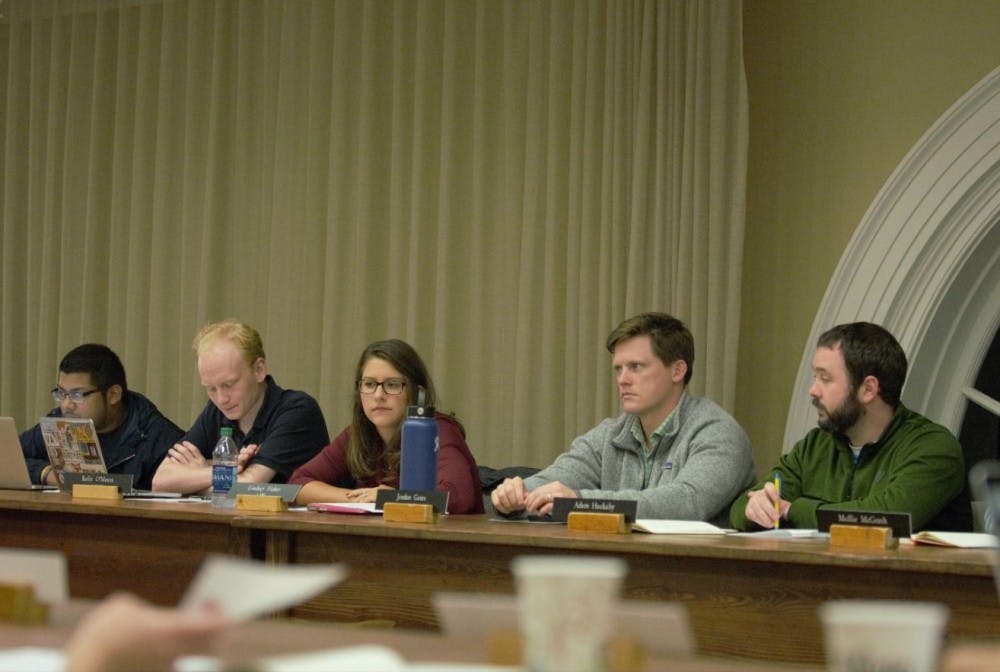The Honor Committee voted unanimously Sunday to create deadlines for students in the Contributory Mental Disorder process to meet. This is the second in a series of reforms to the CMD proposal following the removal of ‘Admission of Act’ in last week’s meeting.
The CMD is a procedure that allows students to request a psychological evaluation prior to moving through Honor proceedings to determine if a mental health condition contributed to the commission of the offense, which is typically overseen by the Office of the Dean of Students and conducted by Student Health or the University’s Counseling and Psychological Services.
The new change to the CMD procedures will establish a timeline which students in the process will have to adhere to if their CMD claim is to be considered in an Honor trial. Students who wish to claim a CMD can do so until seven days after their Investigative Panel officially accuses them of an Honor offense.
A student who intends to take a CMD must contact ODOS within 10 days to schedule a meeting with the dean. Then, the dean will give the student instruction on what information to gather.
Under the change the student must complete the CMD process within 60 days, but the Dean of Students, who is currently Dean Allen Groves, may grant unlimited 30 day extensions as they see fit.
This change will go into effect on Oct. 29, and must be re-approved on March 3, 2019 to remain in the bylaws, otherwise known as a sunset clause. This sunset clause allows the Committee to evaluate the effects of potential changes before they become permanent.
The Committee’s Policy and Procedures subcommittee has been drafting official changes to the Honor CMD procedures, including the removal of Admission of Act and moving the CMD process until after an investigation of the Honor charges has been completed. This change is likely the last of the immediate changes according to Lindsay Fisher, a Law student and policies and procedures subcommittee co-chair.
“We [the subcommittee] identified a couple areas where we thought we could reach a consensus on a sunset clause basis,” Fisher said. ”This is the next phase of that, and the final part of the things we wanted to get done in the short term.”
Originally the timeline was set at 45 days, sparking disagreement within the Committee. Some favored moving the deadline back, while others felt the 45 day timeline to be too restrictive for students, considering wait times for Student Health and CAPS. The Committee passed the amendment to 60 days with a 13-8 vote, with one abstention.
“Putting restrictions on the student who may or may not have a disability doesn’t move us towards the goal of this legislation,” Andrew McCartney, a Curry graduate student and representative, said in a meeting earlier this month, adding that obtaining an appointment at CAPS can be a six-week process.
Those in favor of the 45 day timeline saw it as an incentive to contact ODOS and move the process along, preventing a student from using the process as a way to delay an Honor trial.
“Whatever timeline we put on it is supposed to just be leverage [to get the student to act in order to get an extension]”, Peyton Sandroni, a fourth-year Engineering student and vice chair for investigations, said at Sunday’s meeting.
The Committee also voted unanimously to add a clause which makes a request for more information from ODOS a demonstration of good intent, or cooperation on the part of the student. A request for more information by ODOS will also count as a 30 day extension, allowing the student time to collect the information.
Others on the Committee pointed out that while Groves is the current of Dean of Students, the measure needed to be written with the understanding that the person who is Dean of Students will change in the future.
“I think at some point we have to trust the discretion of people in their roles and not limit them too much,” said Ankita Satpathy, a fourth-year College student and vice chair for hearings.







